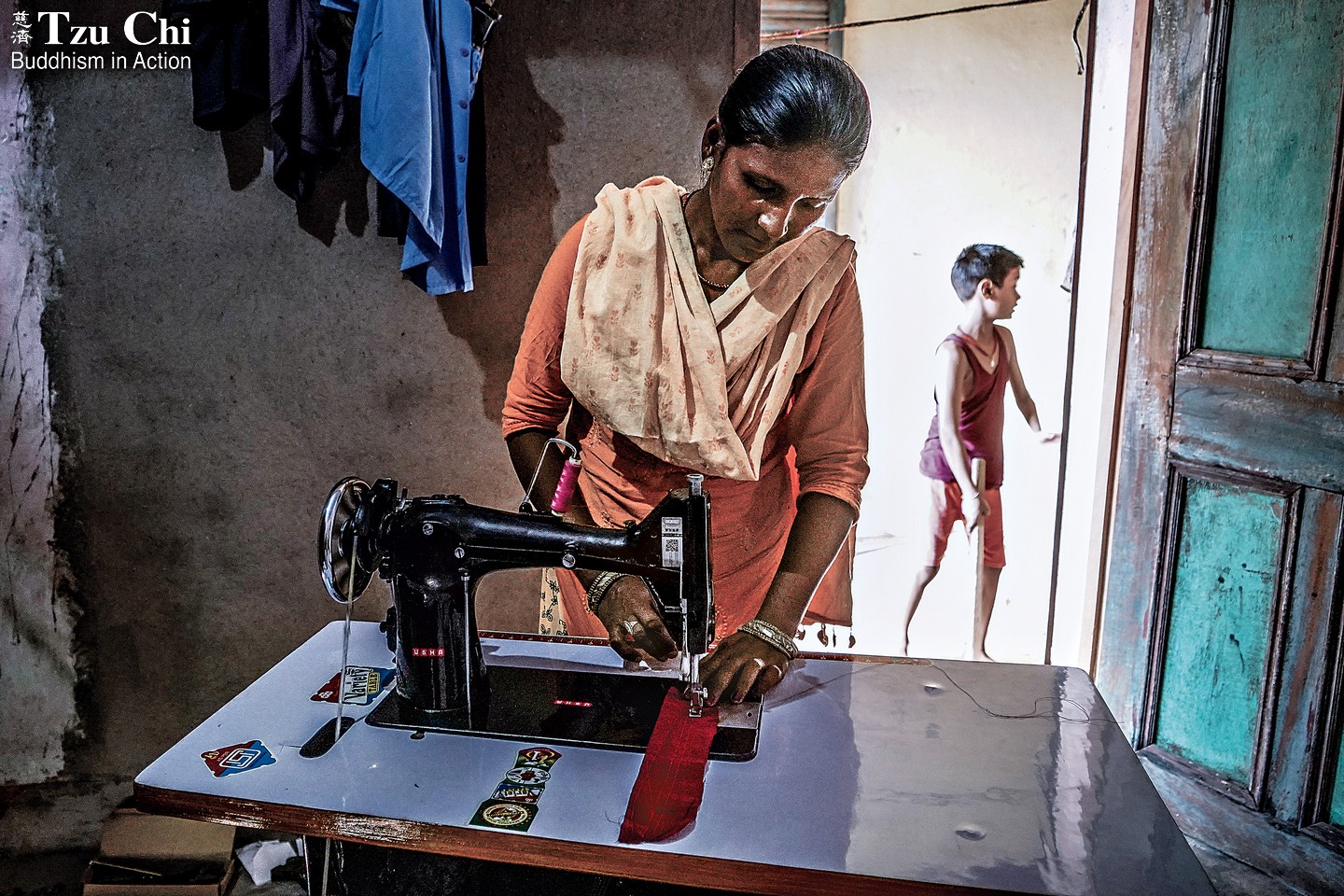By Wei Yu-xian
Translated by Wu Hsiao-ting
Photo by Ye Jin-hong
With Tzu Chi’s support, a mother raising two children on her own is now navigating financial challenges with surer steps, forging a path towards a more stable and promising future.
Tzu Chi volunteers initiated their philanthropic endeavors in Bodh Gaya in March 2023. In June, the first Sunday of each month was officially designated as Charity Day, with all volunteers mobilized to visit and deliver aid to the households under the foundation’s care. By early October 2023, Tzu Chi had added over 20 households from Bodh Gaya to its long-term care recipient list.
Godiya Kumari, a beneficiary of Tzu Chi’s support, was referred to the foundation by a village head in April 2023. Volunteer Vivek Kumar visited Godiya to assess her situation and learned she was a 34-year-old mother raising a 15-year-old son and a 13-year-old daughter. Her husband had passed away in 2015, leading her in-laws to expel her and her children from their home. Godiya brought her children back to her maternal home, but unfortunately, they didn’t receive a warm welcome from her four brothers and two sisters. Being a brave woman, she rented a house in the downtown area of Bodh Gaya and began working as a farmhand in Bakraur. She worked at that four to five days a week and picked up part-time cleaning jobs to supplement her income.
Despite facing financial challenges, Godiya was determined to ensure that her two children received a good education. In addition to regular school, her son and daughter also attended extracurricular classes. During his visit, Vivek discovered that Godiya was four months behind on her rent and owed three months’ worth of tutoring fees. Vivek and other volunteers discussed Godiya’s situation, and decided to offer her daily necessities and monthly financial aid to help her cover her rent.
On August 25, volunteers reached out to Godiya once more to explore opportunities for improving her employment prospects and economic circumstances. Godiya revealed that she had previously participated in a government-sponsored entrepreneurship training seminar with the hope of obtaining a loan to pursue a career as a tailor, but unfortunately, the loan didn’t materialize. To add to her challenges, her landlord intended to renovate the living space she shared with her children into a sewing room, forcing her to find a new place to live.
Because both of her children were studying in Bakraur, Godiya planned to find an affordable rental in the same village. Because she could tailor, she also hoped to work part-time from home making clothes. But there was one hitch: she would need a sewing machine first, something she didn’t have.
The volunteers advised her to find a place to live first, and once everything was settled, they would apply to Tzu Chi on her behalf for a sewing machine. Godiya expressed deep gratitude to the volunteers. She also thanked them for their visits, as no family or relatives had visited them since her husband had passed away.
A brand-new sewing machine
Soon after, volunteers learned that Godiya had moved to a new place near the Niranjana River. In response, they purchased a new sewing machine and delivered it to her on the afternoon of September 14. Godiya’s joy was evident when she saw the sewing machine she had longed for. She lovingly ran her hand over the brand-new equipment.
This sewing machine required assembly and the volunteers spent nearly four hours putting it together. When they were done, they discovered to their dismay that a wooden component of the sewing machine had accidentally cracked during assembly, and the wheel axle at the foot pedal’s edge was loose. As it was getting late, the volunteers had no choice but to return to the Tzu Chi office in Bodh Gaya.
Concerns about whether the sewing machine could function properly prompted the volunteers to schedule another visit for the afternoon of the 21st. During this visit, volunteer Aw Kwai Wan (胡桂雲) brought red fabric from the Tzu Chi office and two cloth bags of different sizes. Her plan was to commission Godiya to sew bags based on the provided samples. On the monthly Charity Day, when volunteers brought daily necessities to Tzu Chi’s care recipients, they also collected rice and money donated by the recipients to help others in need. These bags would serve as containers for the donated rice and money. (Care recipients are encouraged to set aside a portion of rice daily or save spare change for charitable purposes. This is in line with Master Cheng Yen’s teachings to cultivate compassion and empathy for others.)
Godiya’s rental was a simple room located on the first floor of a three-story apartment. The room, measuring approximately 6.7 square meters (70 square feet), had no windows. One side facing the road had an inoperable metal door. Illumination was provided solely by a light bulb. Positioned in one corner were a double-burner gas stove, cookware, and tableware. There was no private bathroom, so she and her children shared a bathroom with other tenants. The family of three slept on a double bed, while a rope on the wall supported a few pieces of clothing. The sewing machine gifted by Tzu Chi stood out as the most prominent item in the compact room.
Upon entering, volunteer Lok Bee Hua’s (駱美花) first action was to take out pre-prepared transparent adhesive tape and mend the unintentional cracks in the sewing machine from days ago. With her head lowered, she said, “I feel really guilty about damaging the new sewing machine. No matter what, I had to come back and check on it.” After completing her repair work, Lok ran her hand over the damaged wooden board, confirming that it was now smooth and should not affect Godiya’s work.
Next, Aw Kwai Wan took out the red fabric and talked with Godiya about the details of sewing the rice and money bags. Godiya set out to sew a sample, but just then a power outage occurred, plunging the room into darkness.
The volunteers quickly turned on their mobile phone flashlights so that Godiya could see well enough to thread the needle and sew. At this moment, Godiya’s son, who had been silently sitting nearby, took out his phone from his pocket, activated the flashlight, and illuminated the area for his mother. Seeing this, the volunteers turned off their flashlights. With the illumination from the boy, Godiya finished threading the needle. Then the sewing machine was moved to the bedside. Godiya, sitting on the bed, started sewing by stepping on the foot pedal.
However, the sewing machine wobbled, raising concerns from Lok Bee Hua that it might be experiencing issues. She requested that Vivek Kumar bring in a professional technician for inspection, adding that Tzu Chi would cover the associated costs.

Godiya tries out a new sewing machine, delivered to her by Tzu Chi volunteers on September 14, 2023.
A smiling face
Despite the issues with the sewing machine, Godiya had already begun accepting orders before the volunteers’ visit. She had even successfully completed a garment for a customer. Sudden power outages were common locally; the volunteers inquired about how she managed during such times, and she shared that her son or daughter helped out by illuminating the workspace with a mobile phone, just like on this particular day.
The volunteers were gratified to learn that. Their joy was heightened when they discovered that the boy took charge of laundry duties, and the girl contributed to cooking and house cleaning. They were happy that Godiya had responsible children.
When Godiya finished sewing one bag, Aw Kwai Wan offered her some suggestions about how to improve the other bags. Godiya had nine more to sew. She told the volunteers she wouldn’t accept payment for her work—it was a token thank-you for Tzu Chi’s assistance. The volunteers praised her for her grateful attitude. She responded with a radiant smile.
On September 29, Vivek Kumar arranged for a professional technician to reassemble the sewing machine. The technician discovered that the pedal had been installed in the wrong direction, impeding normal operation. He made the necessary adjustments and also bought and installed replacement parts for the damaged components. Following these fixes, Godiya’s sewing business officially opened. The timing proved to be a fantastic opportunity for Godiya; the many festivals in India during October and November, when women wear new clothes, provided a chance for her to showcase her tailoring skills and bring in some much needed income.
When volunteers visited again in October, Godiya handed over the completed bags. She mentioned that she had sewn ten more, intended for her friends. She said she would introduce her friends to the practice of setting aside a portion of rice daily for charitable purposes and encourage their involvement. She also told the volunteers that she had received seven orders since their last visit and had already completed five upper garments, each taking about two hours to complete. She was charging 40 Indian rupees (US$0.48) for each. Her joy was obvious despite the modest sums.
Later, Lok Bee Hua shared that when she first met Godiya, the latter’s face was always marked by worry. However, as she and other volunteers started expressing care for her and her children and assisting in resolving their challenges, smiles more frequently illuminated Godiya’s face. “We can tell that she now sees hope for the future,” said Lok.
Given that Godiya’ sewing skills were self-taught, Lok was considering inviting her to the upcoming sewing classes at the Tzu Chi office in Bodh Gaya to refine her skills, thus improving her work opportunities. Reflecting on their farewell just a short while before, Lok recalled how Godiya had taken the initiative to hug her and the other volunteers. It was evident to Lok that Godiya was deeply moved by their assistance, just as Luo herself was touched by the opportunity to help the mother and her children.



